Services on Demand
Article
Indicators
Related links
-
 Cited by Google
Cited by Google -
 Similars in Google
Similars in Google
Share
South African Journal of Science
On-line version ISSN 1996-7489
Print version ISSN 0038-2353
S. Afr. j. sci. vol.112 n.7-8 Pretoria 2016
http://dx.doi.org/10.17159/sajs.2016/a0162
COMMENTARIES
Performance in Chemistry of students who started in the University Preparation Programme: The ripple effect
Charlene Marais; Rina Meintjes; C. Robert Dennis; Jannie C. Swarts
Department of Chemistry, University of the Free State, Bloemfontein, South Africa
Keywords: natural sciences; graduates; postgraduates; foundation programmes
Chemistry has been offered in the University Preparation Programme of the University of the Free State for more than 20 years and has been the only university-accredited module in the Natural Sciences Stream for many years. The positive impact of recurriculation during this time on Chemistry pass rates is demonstrated. Although only a few students from the University Preparation Programme graduated with Chemistry as a major and pursued postgraduate studies in Chemistry, a total of 284 degrees has been awarded to students who started in the Natural Sciences Stream with Chemistry as a core subject, since inception in 1994.
In South Africa, efforts have been made over the past 20 years to address the needs of school-leavers with a matric (Senior Certificate or National Senior Certificate) who did not meet the entrance requirements of higher education institutions. Most of these institutions have addressed these needs by implementing bridging or foundation programmes. Typically, bridging programmes do not earn subsidy, thus forcing higher education institutions to rely on donor funding to implement such programmes.1
The University of the Free State (UFS) and nine other training institutions in the region came together in a consortium in 1993 to implement the Need for Education and Elevation Programme. The name changed to the Career Preparation Programme in 2004 and since 2010 has been known as the University Preparation Programme (UPP). The primary aim of the programme is to offer school-leavers an opportunity to enter general-formative and vocationally directed studies at various higher and further education institutions in the region.1,2 Apart from registering for certain prescribed university-accredited modules, students at UFS also have to register for compulsory development modules. These modules include Introduction to Computer Usage, Skills and Competencies in Life-long Learning and Academic Literacy.1-3 At the different colleges at which the programme is presented, students have to register for the Further Education and Training modules in Computer Practice and Communication. Through the additional compulsory modules, an attempt is therefore made to not only offer students academic information but also address the wider needs of students in higher education.
Initially, the general entrance requirements for the UPP were a Senior Certificate and a matriculation score (M-score) of a minimum of 12 points calculated from a student's Grade-12 subject symbols.1 In 2009, these entrance requirements changed to a National Senior Certificate and a minimum admission point score of 17 points calculated from the achievement levels of the Grade-12 school subjects. From 2011, the entrance requirements have been:
• a National Senior Certificate;
• a minimum admission point score of 20;
• four subjects with a minimum achievement level of 3 (40-19%); and
• language of instruction (English or Afrikaans) on a minimum achievement level of 3 (40-49%).
Students interested in the UPP have a choice of streams in Humanities and Social Sciences, Economic Sciences, and Natural Sciences.1,2 When the UPP was initially launched, a pass in Grade-12 Mathematics on a standard-grade level was a prerequisite for the Economic Sciences and Natural Sciences Streams.1 Currently, additional criteria must be met for enrolment in the Natural Sciences Stream:
• Grade-12 Mathematics on a minimum achievement level of 3 (40-49%) and
• Grade-12 Life Sciences or Physical Sciences on a minimum achievement level of 3 (40-49%).
The objective of this discussion is the performance of UPP students in Chemistry, and so the focus will be on the Natural Sciences Stream of the UPP. At the inception of the UPP, students in the Natural Sciences Stream had to register for university-accredited modules in Mathematics (WIS104) and Chemistry (CEM108). The success rate for the Mathematics module was very poor, as can be seen from Figure 1. Marks higher than 70% were mainly achieved by students who did qualify for mainstream study but registered for the UPP as it gave them the opportunity to complete some of the first-year university modules at a venue closer to home. The pass rate of UPP students for the Introductory Mathematics module, over the period 1994 to 2004, was a dismal 29%. Because of this high failure rate, the mathematics modules for the Natural Sciences Stream of the UPP were downgraded to foundation mathematics modules (WTV154 and WTV164) with a level between school (Grades 11 and 12) and first-year university mathematics.
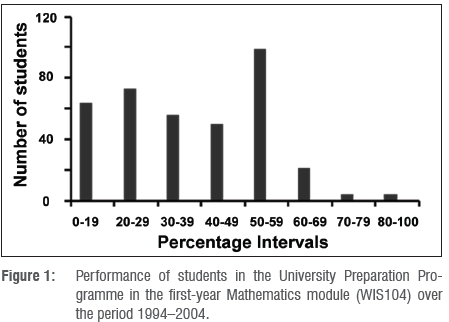
The Chemistry module started as a 32-credit General Chemistry year module (CEM108). It was changed in 2006 to two 16-credit year modules (CHE104 and CHE194) which run in parallel. Since 2010, four 8-credit Chemistry modules have been offered (CHE112 and CHE132 in the first semester, CHE142 and CHE122 in the second semester). The first-semester Chemistry modules are a prerequisite for the second-semester Chemistry modules as is a pass in Mathematics (WTV154) or an achievement level 4 for National Senior Certificate or National Certificate Vocational Mathematics.
The UPP students performed relatively well in the Chemistry modules (Figure 2). The pass rate in the 32-credit module during the period 1994-2005 was 47.0%, while the pass rates in the two 16-credit year modules (CHE104: Inorganic and Analytical Chemistry and CHE194: Physical and Organic Chemistry) were 49.7% and 57.7%, respectively. Since the introduction of the four 8-credit Chemistry modules in 2010, the pass rates for Chemistry have increased dramatically (Figure 3). The average pass rates for the first-semester modules (CHE112: General Foundation Chemistry and CHE132: Organic Chemistry) for the period 2010-2014 were 84.0% and 77.7%, respectively, while pass rates for the second-semester modules (Physical Chemistry and Inorganic and Analytical Chemistry) were 91.1% and 87.9%, respectively.
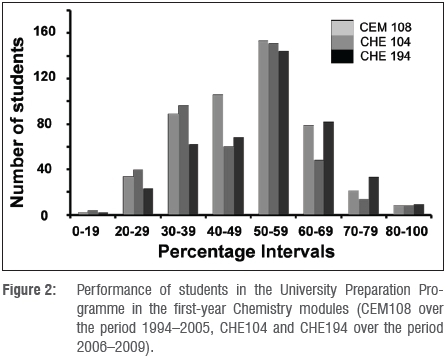
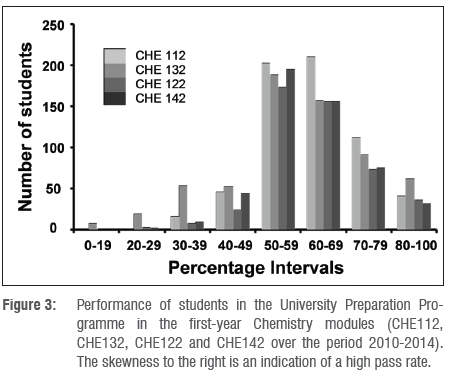
Considering these statistics, prospects for graduate students in Chemistry look bright. However, the interest of the UPP students to continue with Chemistry as a major is disappointing, and furthermore, the academic performance of UPP students continuing with second- and third-year Chemistry at UFS shows the contrary.
Since the start of the UPP until 2014, 1784 students have enrolled for the Natural Sciences Stream of the programme. In total, only 191 students who qualified, enrolled for a second-year Chemistry module over this period. Of these 191 students, 127 students passed at least one of the four second-year Chemistry modules and 69 students passed all four second-year Chemistry modules and were thus eligible to enrol for third-year Chemistry modules. Only 59 out of a possible 69 students enrolled for third-year Chemistry modules. Of these 59 students, 20 of the students (1.1%) passed all four of the third-year Chemistry modules and obtained a BSc Chemistry degree. Of the 20 Chemistry graduates, 6 eventually also obtained a BSc Honours degree in Chemistry followed by an MSc (Chemistry) qualification. One of these Chemistry graduates completed a PhD in Chemistry. (Although outside our sample period, we can report that a second candidate from the above-mentioned six UPP students completed a PhD study in Chemistry during 2015.)
Although graduates in Chemistry coming through the UPP are few, the success of the UPP Natural Sciences Stream can clearly be seen from the graduates in other BSc programmes (Table 1) as well as the graduates in other faculties who started in the Natural Sciences Stream and changed to other faculties after the first year of study (Figure 4).
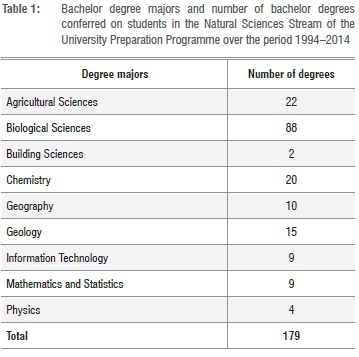
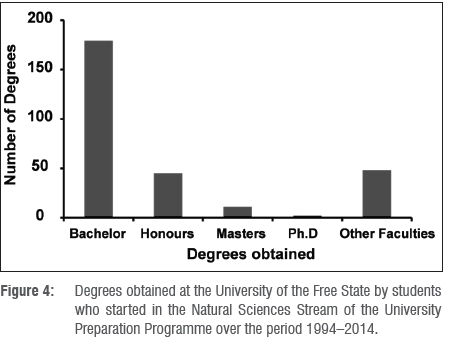
The number of graduates in other BSc programmes (i.e. those not majoring in Chemistry) was 159 (8.9%). The number of graduates in other faculties was 48 (2.7%). Postgraduate degrees obtained in the Faculty of Natural and Agricultural Sciences by UPP students from the Natural Sciences Stream over this period was 57 (Figure 4).
The Chemistry modules, and from 2014 also Biology modules, are the only university-accredited modules in the first year of the UPP in the Natural Sciences Stream. The graduation rate with Chemistry as a major is therefore a concern (only 20 BSc Chemistry degrees (1.1%)). From our perspective, the reason for this low rate could be mainly because of two factors:
1. First-year, first-semester university mathematics is a prerequisite for second-year Chemistry modules at the UFS. UPP students register for foundation mathematics in the first year of study. The required mathematics module is therefore taken in their second year of study and consequently the UPP students can only start with second-year Chemistry in their third year of study after a break of at least one year from Chemistry.
2. The second-year Chemistry modules are popular with students. At the UFS an average of 60% in first-year Chemistry modules is required to qualify for second-year Chemistry modules. UPP students have to compete with mainstream students for a place in the second-year class, as the Chemistry Department can accept only a limited number of second-year students because of facility constraints.
In general, the Faculty of Natural and Agricultural Sciences of the UFS is proud of what has been achieved within the UPP. The fact that 284 degrees have been awarded to students who started in the Natural Sciences Stream since 1994, underlines the success of the UPP The UPP provides deserving students who are not able to meet the admission requirements at universities because of imbalances in the school system, an opportunity to build themselves a career in the competitive work environment.
Acknowledgement
This study would not have been possible without the help of Annemari Eksteen and Jacques Botha of the Directorate for Institutional Research and Academic Planning at the UFS who compiled the data.
References
1. Hay HR, Marais F. Bridging programmes: Gain, pain or all in vain. S Afr J High Educ. 2004;18(2):59-75. http://dx.doi.org/10.4314/sajhe.v18i2.25454 [ Links ]
2. Rabie NE. Access to higher education: The case of the Career Preparation Programme at the University of the Free State [mini-thesis]. Cape Town: University of the Western Cape; 2008. [ Links ]
3. Massyn L. Open learning with success: Practical implementations for facilitators and learners in rural areas. Paper presented at: Second Pan-Commonwealth Forum on Open Learning; 2002 July 28 - August 02; Durban, South Africa. [ Links ]
 Correspondence:
Correspondence:
C. Robert Dennis
Department of Chemistry, University of the Free State
PO Box 339, Bloemfontein 9300
South Africa
crobbie.dennis@gmail.com





![Dichloro(bis[diphenylthiourea])cadmium complex as a precursor for HDA-capped CdS nanoparticles and their solubility in water](/img/en/next.gif)








